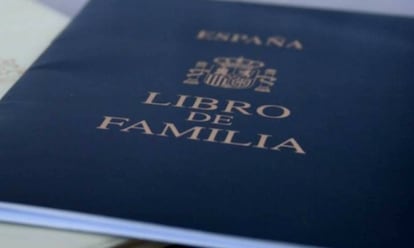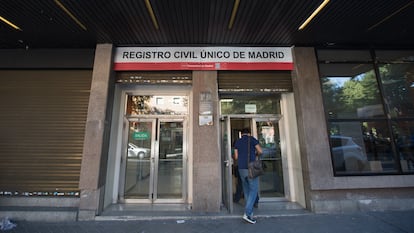Ditching century-old ‘family book,’ Spain adopts individual digital records
The traditional collective document known as ‘Libro de Familia’ is being replaced by a new online file that records life events such as birth, marriage or acquisition of Spanish citizenship


The most precious ledger in millions of Spanish homes, the Libro de Familia or family record book, is in the process of becoming obsolete. From May 1, each newborn is now being individually registered online, and all the facts relating to their identity and civil status will be recorded in the same file over the course of their life.
Meanwhile, existing family record books will no longer be updated. The change is due to the implementation of a 2011 law on civil registry records that has dispensed with the traditional system of categorizing births, marriages, deaths, guardianships and legal representations, instead creating an individual computerized registry for each individual. The existing booklets will continue to be valid temporarily during a transition period while their contents are converted into the new format.
The new digital file will document each individual’s life events, including but not limited to birth, marriage, divorce and death. The individual register will also record the acquisition of Spanish nationality where applicable, the coming of legal age and the benefits of legal age which minors can request through a court of law from the age of 16, thereby ceasing to be subject to parental authority or guardianship. The virtual document will additionally contain any legal modifications regarding acts relating to the estate of people with disabilities.

The online file has a personal code that links the document to the individual’s national identity card (DNI) and the data can now be accessed online with an electronic signature or in-person at the Civil Registry. Unlike the family record book, this individual file incorporates new information automatically – getting the family book updated involved a visit to the Civil Registry.
The reform has made a household document that has lasted for more than a century redundant. The use of the Libro de Familia was approved in 1915 during the reign of Alfonso XIII, with the aim of condensing an entire family’s data into a single document. In July 2010, the government of then-prime minister José Luis Rodríguez Zapatero, of the Socialist Party (PSOE), passed legislation that would change the nature of registration from collective to individual. “It is a radical conceptual change,” said Fernando Caamaño, the Justice Minister at the time. However, due to a lack of consensus between political groups in parliament and changes in government, it has taken 11 years for Zapatero’s legislation to come into force.
A simplified procedure
The president of the Spanish Association of Family Lawyers (Aeafa), María Dolores Lozano, considers the reform to be positive as it facilitates access to information and procedures. She does, however, criticize the fact that the change has not been accompanied by material and human resources to ease the transition. “Many registries are not digitized, especially those of a regional or small-town nature,” she says. “Consequently, it may take time in some areas for the individual digital documents to be issued.”
Luis Calero, secretary general of the administration of justice department at the labor union FSC-CCOO, agrees. “Not all the Civil Registry offices have the technology to issue these individual files,” he says. “The law has been passed, but not the regulation that explains to the registries how to act during the transition period.”
Calero adds that progress has been made over the past decade regarding the digitalization of data on births, marriages and deaths from 1950 onwards – which was recently extended to incorporate documents from 1920 – but that there is still a long way to go.
Lozano states that one of the problems of the family record book arose in the event of divorce. “Both parties want to hold on to it because it is given a great deal of importance,” she says. “It is like the family’s identity card. There is a lot of litigation around it.” She adds that particularly among foreign residents, the book is often not kept up to date, though this is not mandatory.
But the document has been essential for administrative procedures such as obtaining a DNI identity card or a passport for a minor, processing maternity leave, registering children on the Social Security health card, registering as a resident with local authorities, applying for a place at a kindergarten or at a public or subsidized school, applying for unemployment benefits, signing an employment contract or traveling with a baby, among other situations.
English version by Heather Galloway.
Tu suscripción se está usando en otro dispositivo
¿Quieres añadir otro usuario a tu suscripción?
Si continúas leyendo en este dispositivo, no se podrá leer en el otro.
FlechaTu suscripción se está usando en otro dispositivo y solo puedes acceder a EL PAÍS desde un dispositivo a la vez.
Si quieres compartir tu cuenta, cambia tu suscripción a la modalidad Premium, así podrás añadir otro usuario. Cada uno accederá con su propia cuenta de email, lo que os permitirá personalizar vuestra experiencia en EL PAÍS.
¿Tienes una suscripción de empresa? Accede aquí para contratar más cuentas.
En el caso de no saber quién está usando tu cuenta, te recomendamos cambiar tu contraseña aquí.
Si decides continuar compartiendo tu cuenta, este mensaje se mostrará en tu dispositivo y en el de la otra persona que está usando tu cuenta de forma indefinida, afectando a tu experiencia de lectura. Puedes consultar aquí los términos y condiciones de la suscripción digital.








































